Want to Raise Healthy Kids? Give Them Water
8 years ago | Obesity
By Joy Stephenson-Laws, J.D. Founder
The incidence of childhood obesity in the United States has more than tripled since the 1970s. Currently, one in five school-aged children (ages 6-19) are obese. In addition to this, approximately one-third of American youth are overweight. And if our children are overweight or obese, the more likely they are to remain so as adults, which may increase their risk for a variety of diseases, including heart disease, cancer and diabetes.
Healthy meal prepping at home with your kids is a great way to teach them healthy eating habits and help prevent them from becoming overweight or obese. But it also appears that part of the solution to ending childhood obesity in America could be as simple as giving our children water.
The amount of plain water our children drink has diminished over time. Many parents give their children a variety of beverages that contain sugar, caffeine and artificial flavorings. Between 2005-2010, it was reported that U.S. youth only drank an average of 15 ounces of water each day (64 ounces is usually recommended, and this amount may vary depending on factors such as weight and activity level).
Water is the most important of the six essential nutrients our bodies need to remain healthy. (The other five nutrients are protein, fat, carbohydrates, minerals and vitamins). We need water to digest our food, absorb the other nutrients from the food we eat and get rid of waste so that we can increase our chances of maintaining a healthy weight.
A kinesiology and community health professor based in Illinois conducted an analysis of a pilot program in New York City schools that encouraged kids to drink water with lunch. The program was executed in 1,200 elementary and middle schools in New York, between 2009 and 2013. Water dispensers were placed in the schools’ cafeterias.
The result? Student consumption of water tripled during lunch and consumption of whole milk was reduced. There was also a drop in sugar and saturated fat intake.
One year later, researchers found small but significant declines in student risk for being overweight. And overall, the children did not appear to be affected nutritionally by drinking less whole milk.
As a result of this study, it has been suggested that a nation wide expansion, in both public and private schools, of this program could significantly reduce child and adult obesity rates in the U.S. Possibly, more than half a million youths in the U.S. could avoid becoming overweight or obese.
A water intervention in schools across the country could also potentially save billions in medical costs and additional expenses throughout a child’s lifetime. This is because an obese or overweight child is more likely to incur more medical costs as an adult.
The cost-benefit analysis performed in connection with this study showed significant savings associated with the implementation of this water program.
“Based on the decision model, the estimated incremental cost of the school-based water access intervention is $18 per student, and the corresponding incremental benefit is $192, resulting in a net benefit of $174 per student. Subgroup analysis estimates the net benefit per student to be $199 and $149 among boys and girls, respectively. Nationwide adoption of the intervention would prevent 0.57 million cases of childhood overweight, resulting in a lifetime cost saving totalling $13.1 billion. The estimated total cost saved per dollar spent was $14.5.”
So how can you be proactive?
If you struggle with getting your child to drink water at home and they are very dependent on sugar-sweetened beverages, wean them off of these sugar bombs. Freezing ice cubes with fruit, like blueberries and strawberries, and then adding them to water is a great way to add nutritious flavor to plain water.
Additionally, if your child’s school cafeteria does not currently have a water dispenser, make sure to pack water with their lunch. Gather other parents and talk to the authorities at your school about making sure the cafeteria provides a water dispenser. This is what being proactive is all about.
Enjoy your healthy life!
The pH professional health care team includes recognized experts from a variety of health care and related disciplines, including physicians, attorneys, nutritionists, nurses and certified fitness instructors. This team also includes the members of the pH Medical Advisory Board, which constantly monitors all pH programs, products and services. To learn more about the pH Medical Advisory Board, click here.







